List of Mazu temples
Appearance
(Redirected from Mazu temples)
This is a list of Mazu temples, dedicated to Mazu (媽祖) also known as Tian Shang Sheng Mu (天上聖母) or Tian Hou (天后) Chinese Goddess of Sea and Patron Deity of fishermen, sailors and any occupations related to sea/ocean, also regarded as Ancestral Deity for Lin (林) Clan.
Australia
[edit]| Official Name | Neighborhood | Council | Metropolis | Province | Notes | Image |
|---|---|---|---|---|---|---|
| Heavenly Queen Temple[1][2] | Footscray | Maribyrnong | Melbourne | Victoria | Opened 2015, planned completion in 2019.[3] Also known as the Tianhou Gong | 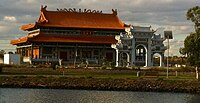
|
Burma (Myanmar)
[edit]| Official Name | Township | District | Division | Notes | Image | ||
|---|---|---|---|---|---|---|---|
| English | Burmese | ||||||
| Script | Romanized | ||||||
| Kheng Hock Keong[4] | ခိန့်ဟုတ်ဗုဒ္ဓဘာသာဘုရားကျောင်း | Hkinhut Buddha Bhasabhu Ra:kyaung: | Latha | West Yangon | Yangon | Opened in 1861. Considered a "Buddhist temple" for official purposes. Also known as the Qingfu Gong[4] | 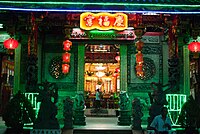
|
China
[edit]Mainland China
[edit]| Official Name | County | Prefecture | Province | Notes | Image | ||
|---|---|---|---|---|---|---|---|
| English | Chinese | ||||||
| Simplified | Pinyin | ||||||
| City Temple of Shanghai[5] | 城隍庙 | Chénghuáng Miào | Huangpu | — |
Shanghai | Includes an altar to Mazu[6] | 
|
| Tianfei Palace in Liuhe | 浏河天妃宫 | Taicang | Suzhou | Jiangsu | Originally built in the Song dynasty. Today's structure contains relics from the Yuan dynasty. Listed as a Major National Historical and Cultural Site. | 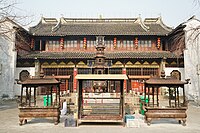
| |
| Old Tianfei Temple | 天妃古庙 | Tiānfēi Gǔmiào | Gulou | Nanjing | Jiangsu | Built in 2005.[7] Located in the Longjiang Shipyard Park. | 
|
| Queen of Heaven Palace[8] | 天后宫[8] | Tiānhòu Gōng | Nankai | — |
Tianjin | Also known as the Niangniang Temple, part of the city's Ancient Culture Street | 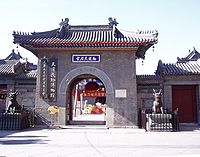
|
| Sea Goddess Palace[9] | 天后宫[10] | Tiānhòu Gōng | Yinzhou | Ningbo | Zhejiang | Also known as the Qing'an Hall. Now used as the East Zhejiang Maritime Affairs and Folk Customs Museum[9] | 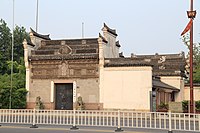
|
| Tianfei Palace[11] | 天妃宫[12] | Tiānfēi Gōng | Songjiang | — |
Shanghai | Also known as the Tianhou Palace, officially the Mazu Cultural Palace. Rebuilt from ruins relocated from its original location near Suzhou Creek downtown to Fangta Park.[11] | 
|
| Tianfei Palace | 天妃宫 | Tiānfēi Gōng | Nanjing | Jiangsu | Located east of Jinghai Temple | 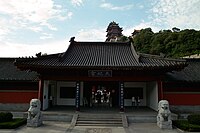
| |
| Tianhou Palace | 天后宫 | Tiānhòu Gōng | Nansha | Guangzhou | Guangdong | Also known as the Meizhou Ancestral Temple | |
| Temple of Mazu | ? | ? | Jiexiu | Jinzhong | Shanxi | Part of the complex of temples clustered around Mt Mian,[13] a holy site since late antiquity primarily associated with the myths around Jie Zhitui and the Cold Food Festival | |
| Original Temple of Mazu | 妈祖祖庙 | Mazu Zumiao | Meizhou Island, Xiuyu District | Putian | Fujian | The original temple of Mazu | 
|
| Queen of Heaven Temple in Yantai | 煙台市天后行宮 | Yantai Shi Tianhou Xinggong | Yantai | Shandong |  | ||
Hong Kong
[edit]Macao
[edit]| Official Name | Parish | Notes | Image | |||
|---|---|---|---|---|---|---|
| English | Chinese | |||||
| Simplified | Pinyin | Cantonese | ||||
| A-Ma Temple[14][15][16] | 媽閣廟 | Mā Gé Miào | Mā Gok Miuh Ma Kok Miu |
São Lourenço | At least as old as 1488, with the present setup dating to 1828.[14] Probable namesake of Macao.[17] Also known as Tianhou,[14] Barra, Juehai, or Zhongjue Temple.[17] | 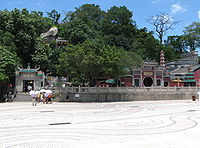
|
Taiwan
[edit]| Official Name | District | County | Notes | Image | ||
|---|---|---|---|---|---|---|
| English | Chinese | |||||
| Traditional | Pinyin | |||||
| Chaotian Temple[18] | 朝天宮 | Cháotiān Gōng | Beigang | Yunlin | Opened in 1700, repeatedly renovated.[18] Also known as the Tianhou or Tianfei Temple.[19] | 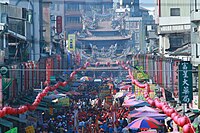
|
| Cide Palace | 慈德宮[20] | Cídé Gōng | Zuoying | Kaohsiung | Rebuilt from its former ruin 1976. Also known as the Liujia, Dianziding, Mazu, or Tianhou Temple.[20] | |
| Ciyou Temple | 慈祐宮 | Cíyòu Gōng | Songshan | Taipei | Opened 1753 | 
|
| Jenn Lann Temple[21] | 鎮瀾宮 | Zhènlán Gōng | Dajia | Taichung | Opened in 1730. Also known as the Mazu Temple.[22] | 
|
| Gongfan Temple | 拱範宮 | Gǒngfàn Gōng | Mailiao | Yunlin | Opened in its present site in 1742.[23] | 
|
| Grand Matsu Temple[24] | 大天后宮 | Da Tianhou Gōng | West Central | Tainan | Built in 1664 as the palace of the exiled Ming prince Zhu Shugui,[25] used by Shi Lang as his headquarters following the Qing conquest of Taiwan in 1683, and converted to a Mazu temple—the first to use her new title of Tianhou—by the Kangxi Emperor the next year.[26][27] | 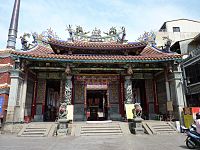
|
| Guandu Temple[28] | 關渡宮[28] | Guāndù Gōng | Beitou | Taipei | Opened 1712. Also known as the Lingshan Temple[28] | 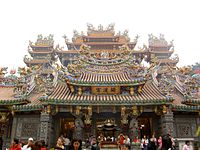
|
| Leh Cherng Temple[29] | 樂成宮[29] | Lecheng Gong | East | Taichung | Moved 1791, rebuilt 1928 and 1963. Also known as the Lecheng Temple[30] | 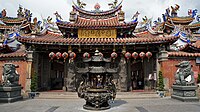
|
| Lungshan Temple[31] | 龍山寺[31] | Longshan Si | Wanhua | Taipei | Opened 1738, rebuilt 1924. A Buddhist temple to Guanyin whose rear hall is dedicated to Mazu.[31] | 
|
| Peitian Temple[32] | 配天宮 | Pèitiān Gōng | Puzi | Chiayi | Opened in 1682[32] | 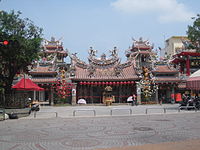
|
| Tianhou Temple[33] | 天后宮 | Tiānhòu Gōng | Xinwu | Taoyuan | Opened 1826.[33] Includes world's 3rd-tallest statue of Mazu. | 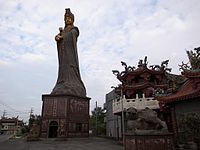
|
| Tianhou Temple[34] | 天后宮 | Tiānhòu Gōng | Lukang | Changhua | Also known as the Tianhou[35] or Tienhou Palace.[36] | 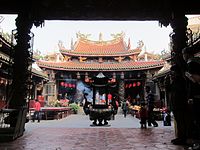
|
| Tianhou Temple | 天后宮 | Tiānhòu Gōng | Cijin | Kaohsiung | Opened in 1673.[37] Also known as the Cijin[38] or Cihou Tianhou Temple.[37] | 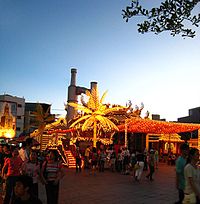
|
| Tianhou Temple | 天后宮 | Tiānhòu Gōng | Magong | Penghu | Usually reckoned Taiwan's oldest Mazu temple. | 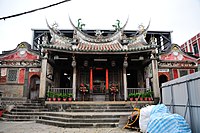
|
| Wanhe Temple[39] | 萬和宮[39] | Wànhé Gōng | Nantun | Taichung | Opened 1726, rebuilt 2001[39] | 
|
Japan
[edit]| Official Name | Municipality | Prefecture | Notes | Image | |||
|---|---|---|---|---|---|---|---|
| English | Japanese | ||||||
| Characters | Romaji | ||||||
| Tomeizan Kofukuji[40] | 東明山興福寺 | Tōmeizan Kōfuku-ji | Nagasaki | Nagasaki | Includes a Mazu Hall (Masu-do), also known as the Bodhisattva Hall (Bosa-do).[41] First opened by Chinese merchants in the 17th century, destroyed by the 1663 fire, rebuilt c. 1670.[41] | ||
| Ma Zhu Miao[42] | 横浜媽祖廟 | Masobyō | Yokohama | Kanagawa | Opened 2006[43] | 
| |
| Sōfuku-ji (Nagasaki)[44] | 崇福寺 | Soufuku-ji | Nagasaki | Nagasaki | Includes a Mazu Hall (Masu-do).[44] | ||
| Tokyo Mazu Temple | 東京媽祖廟[45] | Tokyo Masobyō | Shinjuku | Tokyo | Opened in 1913 |  |
|
| Oma Inari Temple | 大間稲荷神社[46] | Oma Inari Jinja | Shimokita | Aomori | Opened in 1730 | ||
Malaysia
[edit]| Official Name | Subdistrict | District | State | Notes | Image |
|---|---|---|---|---|---|
| Thean Hou Temple[47] | Taman Persiaran Desa | Seputeh | Kuala Lumpur | Opened 1989.[47] Hokkien for Tianhou Palace, though built by Hainanese living in Malaysia[48] | 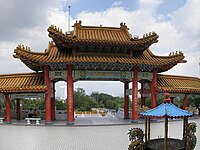
|
| Seng Choon Keong | Kampung Tok'kong | Kelantan | Founded around 300 years ago and local Hokkien dialect for "Sacred Spring Palace" | ||
| Tien How Temple
妈祖庙 |
Batu Pahat | Johor | Tien How Temple also known as Ma Chor Keng or Lim Sz Chong Su Temple was founded in the year of 1912
Address: 7, Jalan Fatimah, 83000 Batu Pahat, Johor GPS: 1.84884, 102.92781 |
||
| Tien Hou Sen Mu Temple
馬來西亞巴生天后聖母殿 |
Klang | Selangor | Tien Hou Sen MuAddress: No.12,14,16, Lorong Dato Dagang 35C,
Taman Sentosa, 41200 Klang, Selangor |
||
| Thin Hai Temple
馬來西亞吧生鎮海宮天后聖母 |
Klang | Selangor | Thin Hai Temple
TBG 1312A, Jalan Harper, Kawasan Perindustrian Harper Light, 41400 Klang, Malaysia, 41400 |
Philippines
[edit]| Official Name | Town | Province | Notes | Image |
|---|---|---|---|---|
| Ma-Cho Temple[49] | San Fernando | La Union | Opened 1975. Annual celebrations syncretize Mazu's worship with Our Lady of Caysasay at St Martin's Basilica in Taal.[50] | 
|
Singapore
[edit]| Official Name | Area | Notes | Image |
|---|---|---|---|
| Thian Hock Keng[51][52] | Outram | Founded in 1839 by Hokkien clan, rebuilt 1842 and 2000.[51] Also known as the Tianfu Gong.[52] | 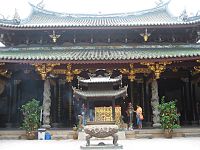
|
| Yueh Hai Ching Temple[53] | Downtown Core | Founded in 1826 by Teochew clan, moved 1855, rebuilt 1895 and 1997. Also known as the Temple of the Calm Sea, Yuehaiqing Miao, and Wak Hai Cheng Bio; consist of two main shrines, one dedicated to Mazu and the other shrine dedicated to the Xuantian Shangdi[53] | 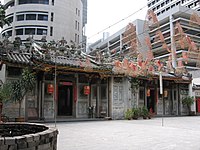
|
Thailand
[edit]| Official Name | District | Province | Notes | Image | ||
|---|---|---|---|---|---|---|
| English | Thai | |||||
| Script | Romanized | |||||
| Wat San Chao Chet | ศาลเจ้าเจ็ด | San Chao Chet | Bang Rak | Bangkok | Also known as the Qishengma Temple. | 
|
| San Chao Qishegma | ศาลเจ้าชิดเซี้ยม้า | San Chao Qishegma | Pom Prap Sattru Phai | Bangkok | Located between 22 July Circle and Hua Lamphong Railway Station, established in the reign of King Rama V (corresponds to the reign of Guangxu Emperor). | |
| San Chao Ah Ma Keng | ศาลเจ้าอาม้าเก็ง | San Chao Ah Ma Keng | Samphanthawong | Bangkok | Located on the 4th floor of Laemthong Pochana restaurant, Soi Charoen Krung 12, also known as Soi Bamrung Rat. | |
| San Chao Hok Lian Keng | ศาลเจ้าฮกเลี่ยนเก็ง | San Chao Hok Lian Keng | Samphanthawong | Bangkok | Located in Soi Charoen Krung 20 in Talat Noi quarter, established in 1840 in the 10th year of Xianfeng Emperor's reign by overseas Chinese Hoklo. | |
| San Chao Mae Tai Wa | ศาลเจ้าแม่ไท้วา | San Chao Mae Tai Wa | Samphanthawong | Bangkok | Located along Khlong Phadung Krung Kasem in Talat Noi quarter. | |
| San Chao Tianhou Shengow | ศาลเจ้าเทียนโหวเซียโกว | San Chao Tianhou Shengow | Thon Buri | Bangkok | Also known as the Gowbow Shrine. | |
| San Chao Mae Thaptim Khlong San | ศาลเจ้าแม่ทับทิม คลองสาน | San Chao Mae Thaptim Khlong San | Khlong San | Bangkok | Inside Lhong 1919. | 
|
| San Chao Mae Thaptim | ศาลเจ้าแม่ทับทิม | San Chao Mae Thaptim | Chom Thong | Bangkok | Considered as the oldest Mazu temple in Thailand founded in 1834, restored in 1874 by Hoklo, also known as Tianhou Shenbow Shrine or Pun Tao Ma Shrine. | |
| San Chao Mae Thaptim Saphan Han | ศาลเจ้าแม่ทับทิม สะพานหัน | San Chao Mae Thaptim Saphan Han | Phra Nakhon | Bangkok | The only Mazu shrine in Rattanakosin Island or Bangkok's old town zone. | 
|
| San Chao Mae Thaptim | ศาลเจ้าแม่ทับทิม | San Chao Mae Thaptim | Sathon | Bangkok | Located between Soi Charoen Krung 63 and Soi Charoen Krung 65 near Saphan Taksin BTS Station, also known as Ah Ma Shrine. | |
| San Chao Mae Thaptim Saphan Lueang | ศาลเจ้าแม่ทับทิม สะพานเหลือง | San Chao Mae Thaptim Saphan Lueang | Pathum Wan | Bangkok | Located in the Sam Yan quarter, also known as Tianhou Shrine. | |
| San Chao Mae Thaptim (Chin) Khao Sam Muk | ศาลเจ้าแม่ทับทิม (จีน) เขาสามมุข | San Chao Mae Thaptim (Chin) Khao Sam Muk | Mueang Chonburi | Chonburi | Located on Khao Sam Muk by the sea near Bang Saen Beach. | |
| ? | ? | ? | in Pattani | |||
| ? | ? | ? | in Phuket | |||
United States and Canada
[edit]| Official Name | Town | State | Notes | Image |
|---|---|---|---|---|
| Ma-Tsu Temple[54] | San Francisco | California | Opened 1986[54] | 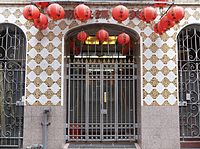
|
| Thien Hau Temple (Austin) | Austin | Texas | Opened 1995 | |
| Thien Hau Temple (Los Angeles)[55] | Los Angeles | California | Opened 1982, renovated 2006[55] | 
|
| Tin How Temple[56] | San Francisco | California | Opened 1852, closed 1950s to 1975. Occupies the top floor of a 4-story building[56] | 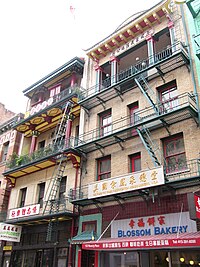
|
| Tin Hau Temple | Honolulu | Hawaii | Opened 1889 | 
|
| Mazu Temple | Toronto(GTA) | Ontario Canada | Opened 2016, The first Mazu Temple of Canada |  |
Vietnam
[edit]| Official Name | County | Prefecture | Province | Notes | Image | |
|---|---|---|---|---|---|---|
| English | Vietnamese | |||||
| Thien Hau Temple (Quang Trieu Guildhall) |
Miếu Thiên Hậu | District 1 | —
|
Ho Chi Minh City | A temple of Cantonese people.[57] | 
|
| Thien Hau Temple[58] (Tue Thanh Guildhall) |
Chùa Bà Thiên Hậu[58] | District 5 | — |
Ho Chi Minh City | Opened c. 1760.[58] Also known as Thien Hau or Tianhou Temple. | 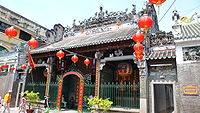
|
| Quan Am Temple[59] (On Lang Guildhall) |
Chùa Quan Âm | District 5 | — |
Ho Chi Minh City | A temple to Guanyin including an altar to Mazu as Thien Hau or A Pho.[59] | 
|
| Thien Hau Temple (Ha Chuong Guildhall) |
Chùa Bà Hà Chương | District 5 | —
|
Ho Chi Minh City | A temple of Hokkien people.[60] | 
|
| Hainan Thien Hau Temple (Quynh Phu Guildhall) |
Chùa Bà Hải Nam | District 5 | —
|
Ho Chi Minh City | A temple of Hainan people.[61] | |
| Thien Hau Temple (Tam Son Guildhall) |
Thiên Hậu Cung | District 5 | —
|
Ho Chi Minh City | A temple of Fuzhou people.[62][63] | 
|
| Thien Hau Temple | Thiên Hậu Cung | Binh Duong | ||||
References
[edit]Citations
[edit]- ^ "Welcome to the Heavenly Queen Temple", Former official site, Melbourne: Heavenly Queen Temple, 2009, archived from the original on 2011-02-08.
- ^ "About Us", Official site, Melbourne: Heavenly Queen Temple, 2016.
- ^ Green, Derek (30 May 2015), "The Queen's Birthday", The Westsider, Melbourne
{{citation}}: CS1 maint: location missing publisher (link). - ^ a b "Kheng Hock Keong", Chinatownology, 2015.
- ^ Official site, Shanghai: Shanghai Chenghuang Miao, 2014, archived from the original on 2008-05-09, retrieved 2016-11-19. (in Chinese)
- ^ "其他由祀典与民间信仰进入的神灵 [Qítā Yóu Sìdiǎn yǔ Mínjiān Xìnyǎng Jìnrù de Shénlíng, Other Spirits Included in Ceremonies and Folk Belief]", Official site, Shanghai: Shanghai Chenghuang Miao, 2014, archived from the original on 2008-05-09, retrieved 2016-11-19. (in Chinese)
- ^ "Zheng He Memorial Shipyard Opens", Singapore Business Times, Singapore, 10 November 2005
{{citation}}: CS1 maint: location missing publisher (link). - ^ a b Historical and Stylistic Architecture of Tianjin: The Queen of Heaven Palace, Tianjin Municipal People's Gov't, 2005. (in Chinese) & (in English)
- ^ a b "A Guide to Qing'an Guild Hall", Official site, Ningbo: East Zhejiang Maritime Affairs Folk Custom Museum, 2010.
- ^ Entrance plaque, Ningbo: Qing'an Hall, 1853.
- ^ a b Koesel (2014), p. 107.
- ^ Original signage, Songjiang: Mazu Cultural Palace, 2014. (in Chinese)
- ^ "Must-See on Mianshan Mountain", Official site, Beijing: China Internet Information Center, 27 July 2010, p. 2.
- ^ a b c "Classified Immovable Properties: A-Ma Temple", Cultural Heritage of Macao, Macao: Cultural Affairs Bureau, retrieved 23 November 2016. (in Chinese and Portuguese), & (in English)
- ^ "Temples: A-Ma Temple", Experience Macao, Macao: Macao Tourism Office, 2016. (in Chinese and Portuguese), & (in English)
- ^ "A-Ma Temple", Official site, Macao: Macau Temple Civilization, 2012. (in Chinese and Portuguese), & (in English)
- ^ a b Van Hinsbergh, Gavin (2013), "A-Ma Temple", China Highlights.
- ^ a b "History & Development", Official site, Beigang: Chao-Tian Temple, retrieved 21 November 2016. (in Chinese) & (in English)
- ^ "Beigang Chaotian Temple", Taiwan: The Heart of Asia, Taipei: Tourism Bureau of the Republic of China, 2016.
- ^ a b "慈德宮", Official site, Kaohsiung: Zuoying District Office, retrieved 23 November 2016. (in Chinese)
- ^ Official site, Taichung: Dajia Jenn Lann Temple, 2013. (in Chinese)
- ^ "Dajia Jenn Lann Temple", Official site, Taichung: Taichung Airport, 2015
- ^ "國定古蹟麥寮拱範宮". National Cultural Heritage Database Management System (in Chinese (Taiwan)). Bureau of Cultural Heritage. Retrieved 14 November 2020.
- ^ Official site, Tainan: Grand Matsu Temple, 2007.
- ^ Keeling, Stephen (2013), "Datianhou Temple", The Rough Guide to Taiwan, Rough Guides, ISBN 9781409350613.
- ^ Bergman, Karl (2009), "Tainan Grand Matsu Temple", Tainan City Guide, Tainan: Word Press.
- ^ Zhang Yunshu (2013), A Study of Mazuism in Tainan [臺南媽祖信仰研究, Tainan Mazu Xinyang Yanjiu], Tainan: Tainan Cultural Bureau, p. 64, ISBN 978-986-03-9415-3.
- ^ a b c "Foundation of Guantu Temple", Official site, Taipei: Guandu Temple, retrieved 18 November 2016. (in Chinese) & (in English)
- ^ a b Official site, Taichung: Leh Cherng Temple, 2016. (in Chinese)
- ^ "Hot Spots: Taichung City", Official site, Taipei: Tourism Bureau of the Republic of China, 2016. (in Chinese) & (in English)
- ^ a b c "The Introduction of Lungshan Temple", Official site, Lungshan Temple, 2013. (in Chinese) & (in English)
- ^ a b "History", Official site, Puzi: Peitian Temple, 2013. (in Chinese)
- ^ a b "Corporation Tianhou Temple" Historical Marker, Xinwu: Taoyuan County Government, 2006. (in Chinese) & (in English)
- ^ Official site, Lukang: Lugang Mazu Temple Commission, 2014. (in Chinese) & (in English)
- ^ "Lukang Tianhou Temple", Taiwan: The Heart of Asia, Taipei: Tourism Bureau of the Republic of China, 2016. (in Chinese) & (in English)
- ^ "Lugang's Amazing Tian Hou Gong Mazu Temple", English in Taiwan, 2014.
- ^ a b "Tianhou Temple at Cihou", Official site, Kaohsiung: Bureau of Cultural Affairs of the Kaohsiung City Government, 2008, archived from the original on 2016-10-06, retrieved 2016-12-16. (in Chinese) & (in English)
- ^ "Cijin Tianhou Temple", Destinations: Asia, London: Lonely Planet, 2016.
- ^ a b c "Information", Official site, Taichung Wanhe Temple Foundation, retrieved 18 November 2016. (in Chinese) & (in English)
- ^ "History", Official site, Nagasaki: Thomeizan Kofukuji, retrieved 23 December 2016.
- ^ a b "Cultural Properties", Official site, Nagasaki: Thomeizan Kofukuji, retrieved 23 December 2016.
- ^ "From the Chairman", Official site, Yokohama: Yokohama Masobyo, 2005.
- ^ "建立への軌跡", Official site, Yokohama: Yokohama Masobyo, 2008. (in Japanese)
- ^ a b Official site, Nagasaki: I Hatada for Nagasaki Soufukuji Temple, 2004. (in Japanese)
- ^ 東京媽祖廟
- ^ 大間稲荷神社(全国神社仏閣図鑑)
- ^ a b "Thean Hou Temple", VisitKL, Kuala Lumpur: Tourism Unit of Kuala Lumpur City Hall, 2014.
- ^ "About Us", Hainan Net, Kuala Lumpur: The Selangor & Federal Territory Hainan Association, 2016.
- ^ "Ma-Cho Temple", Official site, San Fernando: City Government of San Fernando, La Union, retrieved 21 November 2016.
- ^ Rudio, Israel O., "Ma Cho Temple", Official site, San Fernando: Provincial Government of La Union, retrieved 21 November 2016.
- ^ a b "About Us", Official site, Singapore: Thian Hock Keng, 2007. (in Chinese) & (in English)
- ^ a b Tan, Bonny (2016), "Thian Hock Keng", Singapore Infopedia, Singapore: National Library Board.
- ^ a b Thulaja, Naidu Ratnala (2016), "Yeh Hai Ching Temple", Singapore Infopedia, Singapore: National Library Board.
- ^ a b Official site, San Francisco: Ma-Tsu Temple of San Francisco, retrieved 18 November 2016.
- ^ a b "About", Official site, Los Angeles: Thien Hau Temple, 2016. (in Chinese) & (in English)
- ^ a b "Tin How Temple", Chinatownology, 2015.
- ^ "Explore three ancient Chinese guildhalls in Ho Chi Minh City". Tuoi Tre News. September 21, 2020.
- ^ a b c Corfield, Justin (2013), "Ba Thien Hau Pagoda", A Historical Dictionary of Ho Chi Minh City, London: Anthem Press, ISBN 9781783083336.
- ^ a b Corfield, Justin (2013), "Quan Am Pagoda", A Historical Dictionary of Ho Chi Minh City, London: Anthem Press, p. 253, ISBN 9781783083336.
- ^ "Ha Chuong Hoi Quan Pagoda". Lonely Planet.
- ^ Lê, Quốc (October 4, 2016). "Discover the special Chinese guildhall in Cho Lon".
- ^ "Tam Son Hoi Quan Pagoda". Lonely Planet.
- ^ "Tam Son Guildhall". People's Committee of District 5. October 1, 2018.
Bibliography
[edit]- Koesel, Karrie J. (2014), Religion and Authoritarianism: Cooperation, Conflict, and the Consequences, Cambridge: Cambridge University Press, ISBN 9781107037069.

